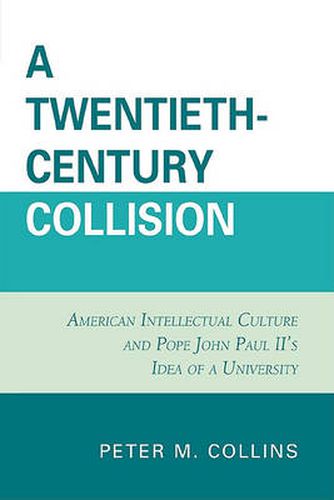Readings Newsletter
Become a Readings Member to make your shopping experience even easier.
Sign in or sign up for free!
You’re not far away from qualifying for FREE standard shipping within Australia
You’ve qualified for FREE standard shipping within Australia
The cart is loading…






A Twentieth-Century Collision explores intellectual culture in the United States during the twentieth century, a topic which cannot be understood without attention to the gradual narrowing of the scope of (academic) philosophy and its diminishing influence. This narrowing signifies a growing indifference to, and elimination of, genuinely metaphysical and prescriptively ethical questions, as well as the bifurcation of faith and reason. American Catholic universities, it is contended in this book, can render a seriously-needed contribution to combating the negative effects of this historical development, one of which is the separation of questions concerning the ultimate meaning of life from rational inquiry. This thesis is pursued by 1) reviewing a highly selective-but also highly representative-sample of pertinent mainstream philosophical principles, and 2) comparing them with principles of Pope John Paul II found in three documents in which he elaborates his views on the nature and role of philosophy (and its relationship to theology) in Catholic higher education. This project is not unrelated to recent, persistent criticism that American Catholic universities have forfeited their identity-and thus their unique contribution to American cultural pluralism.
$9.00 standard shipping within Australia
FREE standard shipping within Australia for orders over $100.00
Express & International shipping calculated at checkout
A Twentieth-Century Collision explores intellectual culture in the United States during the twentieth century, a topic which cannot be understood without attention to the gradual narrowing of the scope of (academic) philosophy and its diminishing influence. This narrowing signifies a growing indifference to, and elimination of, genuinely metaphysical and prescriptively ethical questions, as well as the bifurcation of faith and reason. American Catholic universities, it is contended in this book, can render a seriously-needed contribution to combating the negative effects of this historical development, one of which is the separation of questions concerning the ultimate meaning of life from rational inquiry. This thesis is pursued by 1) reviewing a highly selective-but also highly representative-sample of pertinent mainstream philosophical principles, and 2) comparing them with principles of Pope John Paul II found in three documents in which he elaborates his views on the nature and role of philosophy (and its relationship to theology) in Catholic higher education. This project is not unrelated to recent, persistent criticism that American Catholic universities have forfeited their identity-and thus their unique contribution to American cultural pluralism.